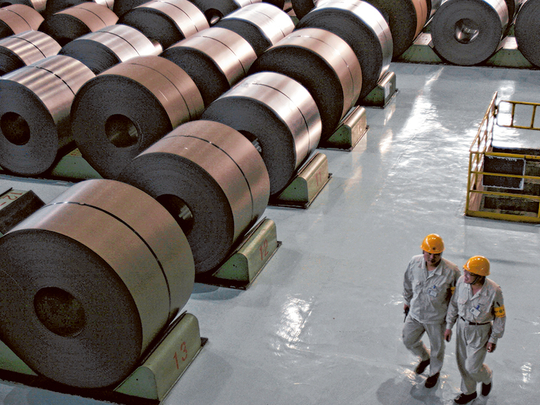
Shanghai: Two of China’s top steelmakers announced plans on Tuesday to merge, creating the world’s second-largest manufacturer of the commodity as markets struggle with a glut caused by Chinese overcapacity.
The world’s second largest economy is trying to overhaul its lumbering state sector and especially its steel industry, by using mergers and restructuring to cut chronic overproduction and create world-beating mills.
Baosteel Group, China’s second-largest steelmaker, will issue new stock to existing shareholders of Wuhan Iron and Steel Group to absorb the other company, the state-owned companies said in separate statements to the Shanghai bourse, where they are listed.
They did not give details.
The two firms rank fifth and 11th respectively in world production capacity.
The merger will form a new firm called China Baowu Iron and Steel Group, China Business News reported late on Monday, adding the state asset watchdog had already okayed the plan and submitted it to the State Council — China’s cabinet — for final approval.
The combined production capacity of the two firms reached 60.7 million tonnes last year, data from the World Steel Association showed, which would make the new entity the world’s second biggest producer by capacity — behind ArcelorMittal.
Chinese steel demand has slumped as economic growth slows and the global steel industry is assailed by overcapacity. The crisis has seen manufacturers in Asia, Europe and the US suffer huge losses and led to political rows and accusations of dumping.
Shanghai-based Baosteel’s net profit plummeted 83 per cent to 1.0 billion yuan ($150 million) last year, while Wuhan Steel lost 7.5 billion yuan, compared with a 1.3 billion yuan net profit in 2014.
Start of a trend
An analyst said the merger between Baosteel and WISG was “merely the beginning” of more such moves in China’s steel industry.
“Restructuring in China’s steel industry is the trend and it’s an unstoppable one,” Chen Bingkun, an analyst at Minmetals and Jingyi Futures, told AFP.
Restructuring of another two Chinese steel giants both based in northeastern province of Liaoning — Ansteel and Benxi Steel Group —is next on the agenda, Shanghai Securities News reported Tuesday. It quoted Chi Jingdong, vice secretary general of the China Iron and Steel Association.
Ansteel is the world’s seventh biggest mill and Benxi Steel ranks 21st.
The listed arms of the two groups suspended trading in Shenzhen on Tuesday pending statements on the report.
Investors in Hong Kong cheered the news, with Angang Steel (Ansteel) shares jumping 2.81 per cent on Tuesday afternoon.
Analysts said the mergers would help China deal with overcapacity that has long plagued manufacturers.
Beijing has vowed to eliminate 100-150 million tonnes of capacity — out of a total of 1.2 billion tonnes — by 2020.
“China is now trying to cut down its steel production through policy. And restructuring of the industry is a second way to help. Once the merged giants form a monopoly in the market, it will start to control production,” said Minmetals’s Chen.
“The result of this restructuring is to integrate China’s steel industry and pave the way for China to export its steel capacity.”
However, another analyst said the merger would not give Chinese mills an edge over global competitors like ArcelorMittal and US Steel.
“I don’t think these mergers will be able to change the current market status of the world’s steel industry,” Qin Jiawei, Hangzhou-based analyst with Xinhu Futures, told AFP, adding that high-end markets would still be dominated by foreign companies.
“China’s high-end steel products don’t have the competitiveness in the international markets. It’s not the size of the company that counts. You can’t change the global steel market by just adding them up.”












